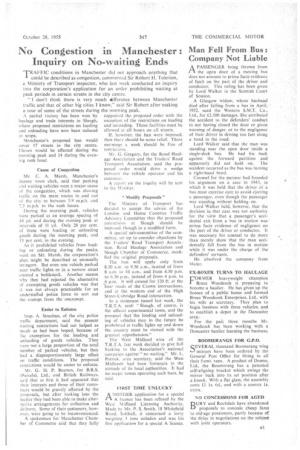No Congestion in Manchester : Inquiry on No-waiting Ends TRAFFIC
Page 37

If you've noticed an error in this article please click here to report it so we can fix it.
conditions in Manchester did not approach anything that I could be described as congestion, commented Sir Robert H. Tolerion, a Ministry of Transport inspector, who last week conducted an inquiry into the corporation's application for an order prohibiting waiting at peak periods in certain streets in the city centre.
"I don't think there is very much difference between Manchester tratlic, and that of other big cities I know," said Sir Robert after making a tour of some of the streets during the morning peak.
A partial victory has been won by haulage and trade interests in Slough, where proposed restrictions on loading and unloading have now been reduced in scope.
Manchester's proposed ban would cover 17 streets in the city centre. Eleven would be affected during the morning peak and 14 during the evening rush hour.
Cause of Congestion Mr. C. A. Marsh, Manchester's deputy town clerk, said that parking and waiting vehicles were a major cause of the congestion, which was slowing traffic on the main routes in and out of the city to between 5.9 m.p.h. and 7.3 m.p.h. in the rush hours.
During the morning peak, vehicles were parked at an average spacing of 44 yd. and during the evening peak at intervals of 31 yd. Only 28 per cent. of these were loading or unloading goods during the morning peak, and 13 per cent. in the evening.
As it prohibited vehicles from loading or unloading during the peaks, went on Mr. Marsh, the corporation's plan might be described as unusually stringent. But even one vehicle parked near traffic lights or in a narrow street created a bottleneck. Another reason why they had rejected the alternative of exempting goods vehicles was that it was not always practicable for an understaffed police force to sort out the exempt from the' unexempt.
Easier to Enforce
Insp. A. Strachan, of the city police traffic department, said the present waiting restrictions had not helped as much as had been hoped, because of the exemption for the loading and unloading of goods vehicles. They were not a large proportion of the total number of parked vehicles, but they had a disproportionately large effect on traffic conditions. The proposed restrictions would be easier to enforce.
Mr. G. H. P. Beames, for B.R.S. (Parcels), Ltd., •and British Railways, said that at first it had appeared that their interests and those of their custoiners would be gravely affected by the proposals, but after looking into the matter they had been able to make alternative arrangements for collection and delivery. Some of their customers, however. were going to be inconvenienced.
A spokesman for Manchester Chamber of Commerce said that they fully supported the proposed order with the exception of the restrictions on loading and unloading. Those facilities must be allowed at all hours on all streets.
If, however, the ban were imposed, then there should be some relief. Three mornings a week should be free of restrictions.
Mr. G. Gregory, for the Road Haulage Association and the Traders' Road Transport Association, said the proposed order would drive a wedge between the vehicle operator and his customer.
A report on the inquiry will be sent to the Minister.
"Modify Proposals"
The Ministry of Transport has decided to accept the advice of the London and Home Counties Traffic Advisory C:ommittee that the proposed restrictions at Slough should be imposed, though in a modified form.
A special sub-committee of the committee, set up to consider objections by the Traders' Road Transport Association, Road Haulage Association and Slough Chamber of Commerce, modified the original proposals.
The ban will apply only from 8.30 a.m. to 9.30 a.m., instead of from 8 a.m. to 10 a.m., and. from 4.30 p.m. to 6.30 p.m., instead of from 4 p.m. to ,6 p.m. it will extend for 120 ft. at the four roads of the Crown 'intersections, and at the western end of the High Street-Uxbridge Road intersection.
In a statement issued last week, the T.R.T.A. said: "Slough, of course, is the official experimental town, and the prospect that the loading and unloading of vehicles may in the future be prohibited at traffic lights up and down the country must be viewed with the greatest apprehension."
The West Midland area of the T.R.T.A. last week decided to give full backing to the Association's national campaign against "no waiting." Mr. L. Patrick. area secretary, said the West Midlands had been fortunate in the attitude of its local authorities. It had no major towns operating such bans, he said.
FIRST TIME UNLUCKY
ANOTHER application for a special A licence has been refused by the West Midland Licensing Authority. Made by Mr. P. S. Smith, 18 Whitefield Road. Solihull, it concerned a lorry weighing 3 tons unladen and was his first application for a special A licence.




































































































